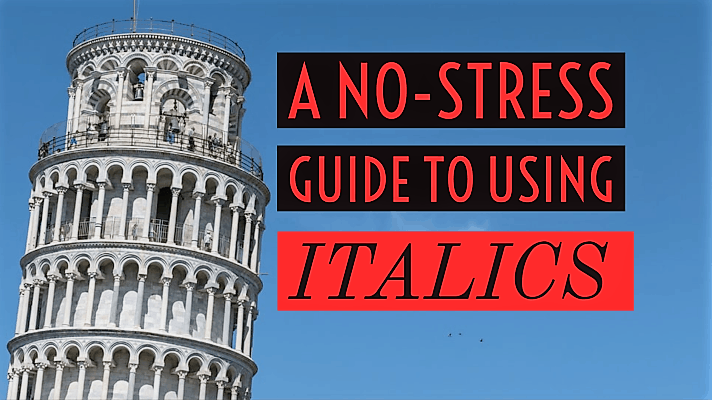Too often the writing community turns a blind eye to the abuse of italics, and someone must put a stop to it—a topic I will return to later in this post.
First, a brief history for font fetishists: Italicized words slant to the right because written handwriting generally slants that way. The font was designed to replace documents traditionally written in a certain handwriting style, and it was first used in 1501 by Venetian printer Aldus Manutius in his edition of Virgil’s works. The font’s Italian origin provides its name.
Nowadays, using italics is a typographical way for writers to differentiate a specific word or phrase from its surrounding sentence. Some word mavens view italics and underlining as interchangeable. A typesetter may see an underlined word and transform it into italics.
Italics are used to set off words or emphasize them.
Use italics for titles of complete works
- Books: Red Specter, Plot Perfect, The Chicago Manual of Style
- Websites, magazines, newspapers: Publishers Weekly, Jungle Red, Buzzfeed
- Films, plays: Black Panther, Can You Ever Forgive Me?, Hamilton, Oh! Calcutta!
- Artworks: Banksy’s Balloon Girl, Judy Chicago’s The Dinner Party
- TV shows, podcasts: The Bozo Show, Deadly Women, Planet Money
- Music collections (digital release/CD/album): Lizzo’s Cuz I Love You, Sgt. Pepper’s Lonely Hearts Club Band by The Beatles
Don’t italicize pieces of a work
Use quotation marks to set off discrete parts of a larger work—say, a chapter of a book or a single song track on a music collection.
He finished “A Bosom Friend,” the tenth chapter of Herman Melville’s Moby-Dick.
On the podcast This American Life, he enjoyed the episode “Switched at Birth.”
The only song she really liked on the Lizzo album Cuz I Love You was the song “Cuz I Love You.”
Also, do not italicize religious books like the Bible, Koran, the Vedas.
That certain je ne sais quoi
The Chicago Manual of Style says if a foreign word—like schadenfreude—has gained enough cultural currency to have made it into the English dictionary, you should not italicize it. This means you would not italicize foie gras or ménage à trois.
That said, it’s not uncommon for writers to italicize foreign words when used in isolation. Even if a book is in English, its text may be sprinkled with the occasional jeu d’esprit. Or perhaps your nasty characters do feel schadenfreude. If including longer passages of text in a foreign language, italics should not be used.
The word is a sound
Ouch! Ick! This is more than just onomatopoeia. Italics may be used when the actual sound of the word is emphasized in the text, whether it’s a grrr growl or a cheep-cheep chirp. This can be confusing:
A pig may oink.
Oink goes the pig!
Use italics for the names of planes, trains, automobiles … and other specifically identified transportation devices
“Too bad about the Titanic.”
She read the dosage instructions while on the Russian Space Station Mir.
Italicized thoughts
If a character’s thoughts interrupt the prose, to avoid confusion a writer may be inclined to set off these thoughts with italics, so their readers better understand the narrative flow.
Approaching the cliff, he turned and saw her. Why was she carrying that stick? There was nowhere for him to go.
Emphasis
Italics may be used to emphasize a word or phrase in a sentence. Generally, this is done within dialogue or internal thoughts.
“He isn’t the only guilty one,” she said.
But hadn’t Shotzi seen him prior to entering Taco Bell?
Italics abuse
As we’ve seen, italics stress a certain word or phrase. To emphasize an alternate point of view, writers sometimes italicize entire sections of prose. For example, mystery authors have been known to intersperse their work with first person passages from as-yet-unknown villains, italicizing entire sections with maniacal abandon.
Don’t do this. Great blocks of italicized text emphasize nothing in particular. These squiggly passages are wearying to read and might be hurried through by readers. Change long passages of italicized prose back to roman text. Overuse of italics dilutes their power.
Avoid straining readers’ eyes with complete passages set in italics. Crafty writers use the meaning of the words on the page to indicate that a new section is shifting gears in some way. Let the prose do the work.
Onward!
Do you sometimes find italics or parentheses or capital letters puzzling? Share your troubles with us on Facebook.





